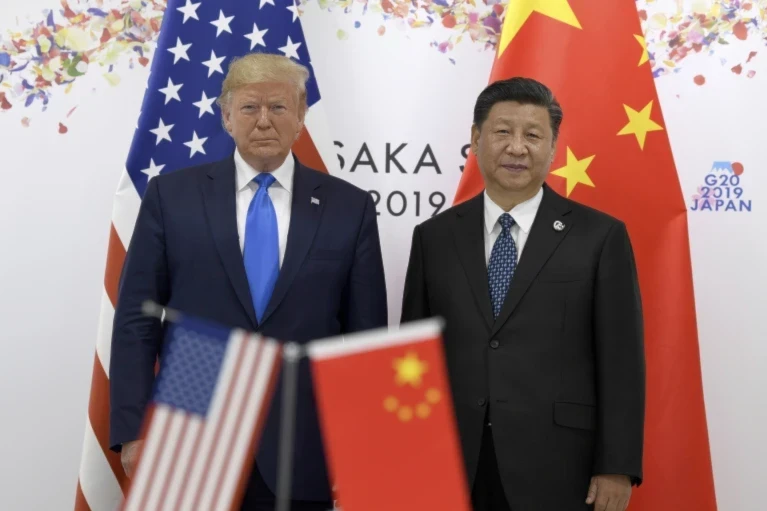US, China to hold high-level trade talks in Switzerland: WP
Senior US and Chinese officials meet in Geneva for the first time in months to discuss easing trade tensions, but The Washington Post reports expectations remain low amid entrenched tariff warfare.
-

US President Donald Trump, left, poses for a photo with Chinese President Xi Jinping during a meeting on the sidelines of the G-20 summit in Osaka, Japan, June 29, 2019. (AP/Susan Walsh)
Geneva, senior US and Chinese officials will meet in Switzerland this weekend for the first high-level engagement in months aimed at easing tensions in their escalating trade war. But according to The Washington Post (WP), expectations for a meaningful breakthrough are low as both sides remain locked in a cycle of tariff retaliation and nationalist posturing.
US Treasury Secretary Scott Bessent and Trade Representative Jamieson Greer are scheduled to sit down with Chinese Vice Premier He Lifeng in Geneva. The talks follow months of escalating tariffs and economic pressure between the two nations, measures so severe they 'amount to an embargo,' according to The Washington Post.
The meeting signals a rhetorical shift from both countries in recent weeks, driven by mutual economic strain. According to The Washington Post, both Washington and Beijing have softened their language, with President Donald Trump expressing a willingness to engage and China citing global expectations as a factor behind its participation.
Bessent announced the meeting in a post on X, crediting Trump for making the US the center of global trade. He wrote: “The world has been coming to the US, and China has been the missing piece,” adding, “What we want is fair trade.”
The US Trade Representative’s office confirmed that Greer would meet his Chinese counterpart “to discuss trade matters.”
According to the Washington Post, tariffs are at embargo levels
Despite these diplomatic gestures, the underlying policy remains aggressive. Trump’s administration has maintained a 145% minimum tariff on Chinese goods, while Beijing has responded with 125% blanket levies and restricted the export of key raw materials. These include components essential for US military drones, consumer electronics, and pharmaceuticals.
The Washington Post notes that Beijing has repeatedly vowed to "fight to the end" and previously refused to begin negotiations unless all tariffs were lifted. However, recent statements from China’s Ministry of Commerce suggest a more pragmatic approach.
“Whether it is fighting or talking, China’s determination to safeguard its own development interests will not change,” the ministry said, reiterating that Washington must reckon with the global harm caused by its unilateral tariffs.
Chinese Vice Premier He Lifeng joins Bessent and Greer in Geneva
He Lifeng’s participation marks a significant political signal, WP reports. Chinese President Xi Jinping, who has maintained a hardline stance throughout the trade war, appears to be allowing subordinates to test the waters for potential compromise, though experts caution not to expect direct leader-to-leader engagement soon.
According to WP, Beijing’s willingness to meet without a prior US concession on tariffs may suggest concern over its weakening economy. Although China posted a 5.4% growth rate in Q1, persistent issues like a property slump, low consumer spending, and youth unemployment have weakened its resilience.
Trump’s tariffs, China’s retaliation leave little room to maneuver
China’s earlier refusal to engage, coupled with nationalist rhetoric quoting Mao Zedong and vowing “never to kneel,” had dimmed hopes of diplomacy. However, according to WP, Beijing’s recent tone reflects a pivot, projecting itself as a responsible actor and emphasizing “international fairness.”
However, China continues to warn that talks cannot be used as cover for further US pressure. “If they say one thing and do another… China will never agree,” the Commerce Ministry said.
Analysts told The Washington Post that these Geneva talks should be viewed as “pre-negotiations.” Scott Kennedy of the Center for Strategic and International Studies warned that both sides remain focused on framing the talks for domestic gain rather than resolving the core issues.
Thanks to @POTUS, the world has been coming to the US, and China has been the missing piece—we will meet on Saturday and Sunday to discuss our shared interests.
— Treasury Secretary Scott Bessent (@SecScottBessent) May 6, 2025
The current tariffs and trade barriers are unsustainable, but we don’t want to decouple.
What we want is fair trade. pic.twitter.com/MYc4XvqME8
“The lack of clear objectives means there’s a risk talks will devolve into a shouting match,” Kennedy said. “Even worse, they could end with some sort of escalation.”
Chinese scholar Shi Yinhong agreed, telling WP that even a limited agreement remains distant. If anything, the most optimistic outcome would be simply agreeing to continue talks.
Final outlook: low expectations, high stakes
As the trade war weighs down manufacturing and exports, Beijing has taken subtle steps to mitigate the impact. According to The Washington Post, China’s central bank has cut mortgage rates, eased bank reserve requirements, and made borrowing easier for commercial banks.
Last week, it lifted sanctions on European lawmakers, paving the way for renewed EU-China investment discussions. Xi Jinping called on European leaders to resist “unilateral bullying” and support “inclusive globalization,” marking 50 years of diplomatic ties with the EU.
While the Geneva talks offer a glimmer of hope for easing US-China trade tensions, WP and several economic experts emphasize that a resolution is not imminent. Still, the start of dialogue may offer some relief to global markets rattled by fears of a complete economic decoupling between the world’s largest economies.

 5 Min Read
5 Min Read








